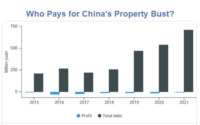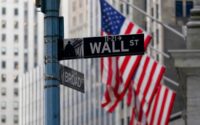Powell Focuses on 2% Inflation as Fed Vows ‘Unconditional’ Fight
(Bloomberg) — Federal Reserve Chair Jerome Powell hammered home his determination to curb the hottest inflation in 40 years as the US central bank vowed that the fight to restore price stability was “unconditional.”
Most Read from Bloomberg
“My colleagues and I are acutely focused on returning inflation to our 2% objective,” he said in welcoming remarks Friday to a Fed conference in Washington on the international role of the US currency. “The Federal Reserve’s strong commitment to our price-stability mandate contributes to the widespread confidence in the dollar as a store of value.”
His comments were the first in public since the Fed on Wednesday raised interest rates by 75 basis points in the largest increase since 1994 and signaled more aggressive moves to come as they fight the hottest inflation in four decades.
The central bank later reinforced that message via its semi-annual monetary report to Congress, stating the policy-setting “committee’s commitment to restoring price stability — which is necessary for sustaining a strong labor market — is unconditional.”
Powell, who was recently confirmed by the US Senate to a second four-year term at the Fed’s helm, testifies before Congress next week to discuss the report and the outlook for the economy.
He and his colleagues have been harshly criticized for being too slow to respond to surging prices, which have infuriated Americans and hurt the standing of President Joe Biden’s Democrats ahead of congressional elections in November. The president chose to keep Powell — a Republican — at the Fed’s helm, who was supported by a large number of senators from both parties.
Lone Dissent
Powell suffered a solitary dissent in Wednesday’s policy vote, though it came from an unexpected source: Kansas City Fed chief Esther George, who cast the first dovish dissent of her career.
In a statement explaining her decision later on Friday, she said that she voted against the 75 basis point increase “ because I viewed that move as adding to policy uncertainty simultaneous with the start of balance sheet runoff.”
The Fed commenced shrinking its massive balance sheet on June 1 at a $47.5 billion monthly pace that will double in September.
“For some time, I have advocated for stopping asset purchases and beginning the runoff of the $9 trillion balance sheet and returning interest rates to more normal levels,” George said. “However, the speed with which we adjust the policy rate is important. Policy changes affect the economy with a lag, and significant and abrupt changes can be unsettling.”
Powell told reporters at a post-meeting press conference that another 75 basis-point hike, or a 50 basis-point move, was likely at the next meeting of policy makers in July. Officials forecast rates will rise this year, to 3.4% by December and 3.8% by the end of 2023. That was a big upgrade from the 1.9% and 2.8% that they penciled in for their March projections.
Minneapolis Fed President Neel Kashkari said that while he supported Wednesday’s move and could back one of the same size next month, uncertainty about how much tightening will b e needed raises caution about too much more front-loading.
“A prudent strategy might be, after the July meeting, to simply continue with 50 basis-point hikes until inflation is well on its way down to 2%,” he said in an essay Friday. “Obviously, in such a scenario, the FOMC would still need to remain data-dependent and have the flexibility to account for economic developments that might arise.”
(Updates with timing of upcoming testimony in fifth paragraph.)
Most Read from Bloomberg Businessweek
©2022 Bloomberg L.P.
[ad_2]
Source link


